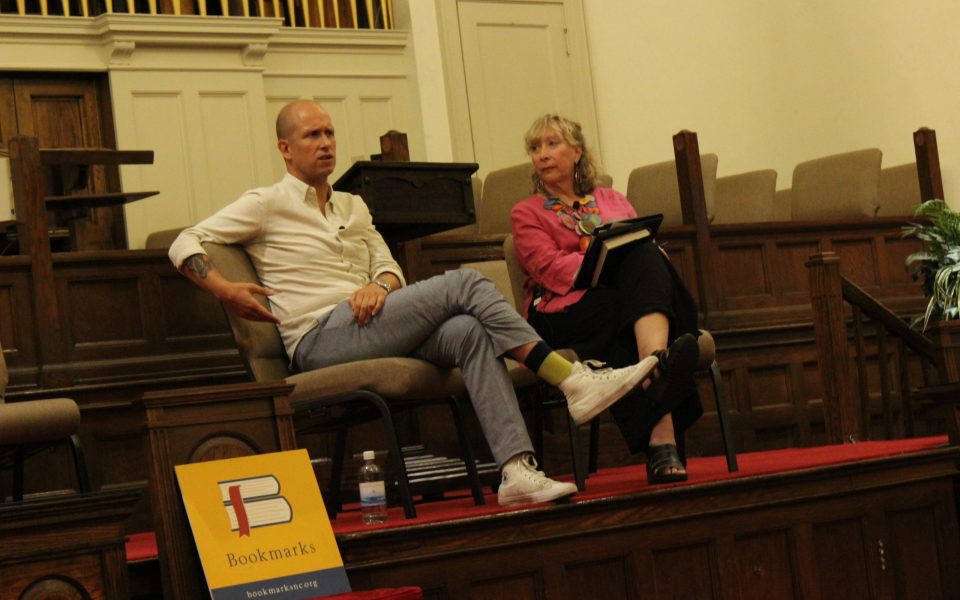Even white nationalists host backyard barbecues according to Vegas Tenold.
“The humanity of it makes you want to get along with this person,” Tenold explained.
Sitting at the front of the Calvary Moravian Sanctuary in Winston-Salem, the bald Norwegian journalist wore a white-collared, button-down shirt with the sleeves rolled up to expose his forearm tattoos, and pale-ish blue slacks with white high-top Converses.
Tenold, who was at the Bookmarks Festival on Sept. 8 to talk about his new book, Everything You Love Will Burn: Inside the Rebirth of White Nationalism in America, explained to the audience that most of the people in his book were actually “weirdly pleasant in a way” and that they “looked regular.” After spending six years embedded in different factions of white supremacy, Tenold found that the extraordinary power of human empathy had betrayed him.
At one point during his talk he described a moment when he realized his integrity as a journalist had started to slip after he had become complacent and too familiar towards Matthew Heimbach, the founder of the Traditionalist Worker Party, a neo-Nazi, white-nationalist group.
“He asked me why I hadn’t asked him about the Holocaust,” Tenold recalled. “And I thought to myself, Why hadn’t I asked him about the Holocaust? I realized that I had been slipping.”
Learning from this experience, Tenold warned that despite the mundane, utterly normal rituals that some white nationalists practice, like hosting barbecues and singing along to Les Mis, that it should never be forgotten how abnormal and abhorrent their beliefs are. In other words, don’t let the wolf fool you.
And yet, other writers argued that empathy is necessary and one of the most powerful tools that literature and writing offers in the present moment.
A few hours after Tenold gave his talk, a group of writers sat on a stage at Hanesbrands Theatre for a panel titled, “Truth You Don’t See: YA Authors on Reality.” The five authors who spanned the ethnic, generational and gender spectrum described how writing young adult books could help foster empathy in readers for marginalized, often forgotten characters.
In her debut novel, Allegedly, writer Tiffany D. Jackson, one of the panelists, tells the fictional tale of Mary, a young black girl who is convicted of murdering a white child while fighting for survival in a group home. To craft Mary’s story in an authentic way, Jackson spent hours doing research on group homes for girls and even interviewed a few in person, using their experiences to write Mary’s character.
“I like to write about real-life cases,” Jackson said. “I want teens to know that these things are happening so they can change the world.”
On a panel in the building next door, author Ingrid Rojas Contreras told the audience how she draws from her experience as a Colombian immigrant to craft impactful stories.
Her debut novel, Fruit of the Drunken Tree, tells the story of an unlikely friendship between a young girl and a teenage maid during the height Pablo Escobar’s violent reign in Colombia. Contreras hopes that her readers develop care and feeling for her main characters, who likely would have been turned away at the US southern border had they existed in reality in the present day.
“Empathy is the biggest goal for me,” Contreras said. “Hearing other people’s stories opens you up to experiences you haven’t had. It’s about broadening your experiences.”
Join the First Amendment Society, a membership that goes directly to funding TCB‘s newsroom.
We believe that reporting can save the world.
The TCB First Amendment Society recognizes the vital role of a free, unfettered press with a bundling of local experiences designed to build community, and unique engagements with our newsroom that will help you understand, and shape, local journalism’s critical role in uplifting the people in our cities.
All revenue goes directly into the newsroom as reporters’ salaries and freelance commissions.


Leave a Reply